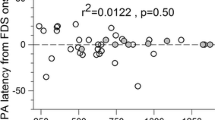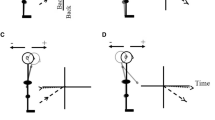Abstract
Anticipatory postural adjustment (APA) during bimanual action is observed when participants hold an object in one hand and then lift that object with the other hand. The decrease in activity of a forearm flexor muscle prior to an active forearm unloading acts to stabilize the forearm position. Recent studies have investigated the influence of the corticospinal system on muscle activity during APA through transcranial magnetic stimulation. It was shown that at different times during APA, the amplitude of motor-evoked potentials in the forearm flexors decreased in conjunction with the decrease of muscle activity. If the unloading is triggered via an electromagnet by lifting an equal weight by the other arm, the anticipatory postural adjustment is learned through the repetition of unloading (three series of 20 trials). Using the transcranial magnetic stimulation, we examined changes in the motor-evoked potential in the forearm flexors before and after APA learning. Motor-evoked potential amplitude did not significantly change as forearm flexor activity decreased. The motor-evoked potential/background electromyogram ratio, however, increased in the final learning session in comparison to the initial learning session and stationary loading. The present results corroborate a hypothesis on the fundamental role of the motor cortex in the suppression of synergies that interfere with the execution of the new coordination in the process of motor learning.






Similar content being viewed by others
References
Aruin AS, Latash ML (1995) Directional specificity of postural muscles in feed-forward postural reactions during fast voluntary arm movements. Exp Brain Res 103:323–332
Aruin AS, Nicholas JJ, Latash ML (1997) Anticipatory postural adjustments during standing in below-the-knee amputees. Clin Biomech 12:52–59
Beloozerova IN, Sirota MG, Orlovsky GN, Deliagina TG (2005) Activity of pyramidal tract neurons in the cat during postural corrections. J Neurophysiol 93:1831–1844
Carrol TJ, Riek S, Carson RG (2001) Corticospinal responses to motor training revealed by transcranial magnetic stimulation. Exerc Sport Sci Rev 29:54–59
Classen J, Liepert J, Wise SP, Hallett M, Cohen LG (1998) Rapid plasticity of human cortical movement representation induced by practice. J Neurophysiol 79:1117–1123
Davey NJ, Romaiguere P, Maskill DW, Ellaway PH (1994) Suppression of voluntary motor activity revealed using transcranial magnetic stimulation of the motor cortex in man. J Physiol 477:223–235
Deliagina TG, Orlovsky GN, Zelenin PV, Beloozerova IN (2006) Neural bases of postural control. J Physiol 21:216–25
Diedrichsen J, Verstynen T, Lehman SL, Ivry RB (2005) Cerebellar involvement in anticipating the consequences of self-produced actions during bimanual movement. J Neurophysiol 93:801–812
Dufosse M, Hugon M, Massion J (1985) Postural forearm changes induced by predictable in time or voluntary triggered unloading in man. Exp Brain Res 60:330–334
Horak F, Macpherson J (1996) Postural orientation and equilibrium. In: Handbook of physiology. Exercise: regulation and integration of multiple systems, sect 12, chap 7. American Physiological Society, Bethesda, pp 255–292
Hugon M, Massion J, Wiesendanger M (1982) Anticipatory postural changes induced by active unloading and comparison with passive unloading in man. Pflugers Arch 393:292–296
Ioffe M, Massion J, Gantchev N, Dufosse M, Kulikov MA (1996) Coordination between posture and movement in a bimanual load-lifting task: is there a transfer? Exp Brain Res 109:450–456
Ioffe M, Massion J, Schmitz K, Viallet F, Gantcheva R (2002) Reorganization of motor patterns during motor learning a specific role of the motor cortex. In: Latash ML (ed) Progress in motor control-II. Human Kinetics, Champaign, pp 123–145
Ioffe ME, Chernikova LA, Ustinova KI (2007) Role of cerebellum in learning postural tasks. Cerebellum 6:87–94
Kang N, Shinohara M, Zatsiorsky, Latash ML (2004) Learning multi-finger synergies: an uncontrolled manifold analysis. Exp Brain Res 157:336–350
Kawanishi M, Yahagi S, Kasai T (1999) Neural mechanisms of soleus H-reflex depression accompahying voluntary arm movement in standing humans. Brain Res 832:13–22
Kazennikov O, Solopova I, Talis V, Grishin A, Ioffe M (2005) TMS-responses during anticipatory postural adjustment in bimanual unloading in humans. Neurosci Lett 383:246–250
Kleim JA, Barbay S, Cooper NR, Hogg TM, Reidel CN, Remple MS, Nudo RJ (2002) Motor learning-dependent synaptogenesis is localized to functionally reorganized motor cortex. Neurobiol Learn Mem 77:63–77
Liepert J (2006) Motor cortex excitability in stroke before and after constraint-induced movement therapy. Cogn Behav Neurol 19:41–47
Liepert J, Classen J, Cohen LG, Hallett M (1998) Task-dependent changes of intracortical inhibition. Exp Brain Res 118:421–426
Ljubisavljevic M (2006) Transcranial magnet stimulation and the motor learning-associated cortical plasticity. Exp Brain Res 173:215–22
Massion J, Ioffe M, Schmitz C, Viallet F, Gantcheva R (1999) Acquisition of anticipatory postural adjustments in a bimanual load-lifting task: normal and pathological aspects. Exp Brain Res 128:229–235
Monfils MH, Plautz EJ, Kleim JA (2005) In search of the motor engram: motor map plasticity as a mechanism for encoding motor experience. Neuroscientist 11:471–483
Pascual-Leone A (2001) The brain that plays music and is changed by it Ann N Y Acad Sci 930:315–329
Pascual-Leone A, Dang N, Cohen LG, Brasil-Neto JP, Cammarota A, Hallett M (1995) Modulation of muscle responses evoked by transcranial magnetic stimulation during the acquisition of new fine motor skills. J Neurophysiol 74:1037–1045
Paulignan Y, Dufosse M, Hugon M, Massion J (1989) Acquisition of co-ordination between posture and movement in a bimanual task. Exp Brain Res 77:337–348
Romaiguere P, Calvin S, Roll J-P (2004) Transcranial magnetic stimulation of the sensorimotor cortex alters kinaesthesia. Neuroreport 16:693–697
Schmitz C, Assaiante C (2002) Developmental sequence in the acquisition of anticipation during a new co-ordination in a bimanual load-lifting task in children. Neurosci Lett 330:215–218
Solopova IA, Kazennikov OV, Deniskina NB, Levik YS, Ivanenko YP (2003) Postural instability enhances motor responses to transcranial magnetic stimulation in humans. Neurosci Lett 337:25–28
Sohn YH, Jung HY, Kaelin-Lang A, Hallet M (2003) Excitability of the ipsilateral motor cortex during voluntary hand movement. Exp Brain Res 148:176–185
Soto O, Valls-Solé J, Shanahan P, Rothwell J (2006) Reduction of intracortical inhibition in soleus muscle during postural activity. J Neurophysiol 96(4):1711–1717
Tamarova ZA, Sirota MG, Orlovsky GN, Deliagina TG, Beloozerova IN (2007) Role of GABA A inhibition in modulation of pyramidal tract neuron activity during postural corrections. Eur J Neurosci 25(5):1484–1491
Tyc F, Boyadian A (2006) Cortical plasticity and motor activity studied with transcranial magnetic stimulation. Rev Neurol 17:469–495
Vialett F, Massion J, Massarino R, Khalil R (1992) Coordination between posture and movement in a bimanual load lifting task: putative role of a medial frontal region including the supplementary motor area. Exp Brain Res 88:674–684
Zettel JL, McIlroy WE, Maki BE (2002) Can stabilizing features of rapid triggered stepping reactions be modulated to meet environmental constraints? Exp Brain Res 145:297–308
Acknowledgments
The authors thank Angela Antkowiak for reading and correcting the manuscript. The study was supported by the Russian Foundation of Basic Research (grants # 06-04-48891, 05-04-49401 and 05-04-48610), Russian Foundation of Humanity (grant 06-06-00275).
Author information
Authors and Affiliations
Corresponding author
Rights and permissions
About this article
Cite this article
Kazennikov, O., Solopova, I., Talis, V. et al. Anticipatory postural adjustment: the role of motor cortex in the natural and learned bimanual unloading. Exp Brain Res 186, 215–223 (2008). https://doi.org/10.1007/s00221-007-1224-5
Received:
Accepted:
Published:
Issue Date:
DOI: https://doi.org/10.1007/s00221-007-1224-5




